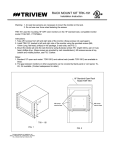Download Go Beyond the Sale
Transcript
LAP Leadership, Attitude, Performance ...making learning pay! Selling LAP 130 Performance Indicator: SE:076 Go Beyond the Sale Customer Service in Selling Relationship v. department Great expectations Keys to customer service Go Beyond the Sale LAP-SE-130-CS © 2007, MarkED Trey is a technology coordinator for a local school district. He recently needed to purchase several new monitors and printers for one of the school libraries. He found a great price on monitors from ABC Company and a great price on printers from XYZ Company. Neither shipment arrived on the expected date. When Trey called ABC Company, he was referred to voicemail. When he called XYZ Company, he was transferred to the shipping and delivery department right away. He spoke to a representative who tracked the shipment and let him know that it was late due to bad weather and would arrive the next day. He never heard back from ABC Company, although the monitors did arrive two days later. What does this situation illustrate about the importance of customer service in selling? ABC Company gave Trey the best price, but will it be enough to turn him into a repeat customer? Customer service is a key component of the selling relationship. Read on to learn more about this important aspect of selling. Explain how customer service facilitates sales relationships. Identify opportunities to use customer service in facilitating sales relationships. LAP-SE-130-CS © 2007, MarkED If you’re headed for a career in sales, you’re going to learn a lot about how to make a sales presentation and close the deal. And when the deal is done, your work is over, right? Wrong! Servicing the sale is one of your most important tasks as a salesperson. Making the presentation and closing the sale are just the beginning of the long journey of generating and keeping loyal customers for your business. Customer service in selling When it comes to selling, what does customer service really mean? Is it a counter at the back of a retail store that accepts returns and exchanges and provides gift wrapping? Well, maybe. In that case, customer service is more of a function than a process, more of a department than a relationship. The kind of customer service you need to demonstrate as a salesperson goes far beyond the boundaries of a mere business function. It’s an attitude, a set of skills, and a style of work that you should carry with you for your entire career. Simply put, customer service encompasses all activities and benefits provided by a business to its customers to create goodwill and customer satisfaction. Customer service should result in enhancing and facilitating the customer’s use of the good or service. For instance, if a customer purchases a new digital camera, how useful is it to him/her without knowing how to use it? A successful salesperson provides quality customer service to that customer by making sure s/he has the necessary training to use this product, whether that means going through the manual during the sales presentation or demonstrating it in the store. The competition starts here In selling, customer service is where the real competition among businesses begins. Over time, the quality of certain products can be easily matched among competitors. One example is cellular phone service. The product itself does not vary greatly among providers, nor does the price. Therefore, customer service Go Beyond the Sale • Advertising—No doubt, your business invests in advertising to let potential customers know that your products and services are second to none. When those potential customers come to see you, they expect you to make good on your advertising claims of quality customer service. becomes key. What “perks” or advantages does one provider offer over another? Which providers offer the best online support or the easiest bill-paying options? As a salesperson, you must have the ability to show your prospects that your company meets (and hopefully exceeds) these types of customer-service expectations. Shifting expectations One aspect of customer service that keeps salespeople on their toes is that customer service means different things to different customers. Every prospect comes to you with his/her own unique expectations. These expectations may be based on: • Past experience—If the customer has done business with you before, s/he will expect the same or higher quality of customer service. If another salesperson offered free installation on the last appliance the customer purchased, you can be assured that the customer will be looking for the same deal from you. Customers will also compare your service to past service they have received from your competitors. • Word-of-mouth—Never underestimate the power of word-of-mouth information when it comes to business and sales. Many new prospects will come to you based on the recommendations of family, friends, or acquaintances. They will expect to receive the same quality of customer service that others have received. • Personal needs—Some customers may place high value on extended product warranties, while others may not be as concerned. Some customers may need more help than others obtaining financing or credit. Successful salespeople will learn to read individual customers and discover how to cater to their personal needs. Benefits of customer service The importance of providing quality customer service in sales cannot be overstated. Customer service benefits sales organizations by helping to build profits. Businesses exist to make money, and to do so, they rely on their customers. Providing quality customer service influences profits in two major ways: • Building partnerships with current customers. Loyalty is the name of the game—successful salespeople understand the importance of repeat business. They strive to provide high quality customer service, so they can build long-term partnerships with their customers. After all, maintaining a relationship with a current customer is less expensive and time-consuming than generating a new customer relationship. Although customer expectations vary from person to person, there are some basic qualities of customer service that you can be sure customers are looking for. These include reliability, empathy, accuracy, consistency, and responsiveness. Go Beyond the Sale LAP-SE-130-CS © 2007, MarkED Besides repeat business, another benefit of having loyal customers is referrals. When your customers are satisfied, they will tell their family and friends about your good service. In a sense, these satisfied customers become another “sales force” reaching out to prospects for you. What makes this benefit even better is that this sales force can reach potential customers whom you might not be able to reach on your own! • Generating new customers. Sales increase when organizations create new business and new accounts. Providing high quality customer service can help generate new customers by building an excellent reputation for the company. When a business has a reputation for good customer service, prospective customers are more likely to bring their business there. Summary Customer service encompasses all activities and benefits provided by a business to its customers to create goodwill and customer satisfaction. Servicing the sale is one of your most important tasks as a salesperson. The kind of customer service you need to demonstrate goes far beyond the boundaries of a mere business function. Customers’ expectations vary and depend on past experience, word-of-mouth information, advertising, and personal needs. The two main benefits of providing quality customer service are building profits through existing customers and through new customers. Lee’s company is holding a contest for its salespeople, and the winner gets an allexpenses paid cruise! Of course, Lee really wants to win. To do so, he really needs to close the sale he’s currently working on. The customer wants to buy only if the product can 1. What does customer service in selling mean? be delivered by Thursday. Lee knows it’s a bit 2. How does customer service affect competition among sales organizations? of a stretch for the shipping department, but 3. Describe the factors that affect customers’ service expectations. for Thursday. Even if the shipment is late, 4. Describe the two main benefits of providing quality customer service. things over with the customer later. What do LAP-SE-130-CS © 2007, MarkED he promises the customer on-time delivery he’ll still win the cruise, and he can smooth you think? Are Lee’s actions justified? Go Beyond the Sale You understand the importance of customer service in selling and how it helps build profits through new and existing customers. But what does quality customer service really mean? How can salespeople demonstrate it to their customers? Pre-Sale Opportunities Although most of the time, “servicing the sale” refers to actions that take place after the deal has been closed, salespeople still have many opportunities to provide customer service before the sale. One way is through suggestion selling. You can add value to a customer’s experience by suggesting additional products or services that will enhance his/her primary purchase. For example, if you are talking to a customer about a particular guitar, you might also want to point out the strap that goes along with it. Using the strap will make the guitar easier to play and should add value to the purchase of the guitar. Appropriate, well-timed suggestion selling can go a long way toward building solid partnerships with customers. Another way to provide customer service before the sale closes is to provide ample product information. Customers can use all the help they can get when it comes to making purchase decisions, especially for highticket items, such as vacations, houses, or expensive electronic equipment. Successful salespeople make sure that customers have all the information they need to make sound, well-informed decisions. When customers are happy with their purchases, they won’t forget the salesperson who helped them sort through the options. And last, but not least, salespeople can demonstrate quality customer service before the sale by making only promises that they can keep. It sounds easy enough, but it’s amazing how many salespeople disregard this simple rule in an effort to close the deal. If you tell a customer that s/he can receive online support for a product 24 hours a day, you must be Go Beyond the Sale certain that this is actually the case. If you tell a customer that routine maintenance for the product will be performed free of charge, you must make sure this is true and also take the time to explain what “routine maintenance” means to your company. Customers will not forget the promises you make to them during sales presentations. If you can’t keep these promises after the sales close, you will have unhappy customers and damaged client relationships. Post-Sale Opportunities After the sale closes is a critical time for businesses to provide quality customer service. This time of follow-through is often what separates successful businesses from unsuccessful businesses. No doubt, you made many claims about your company’s high standards for customer service during your sales presentation. Now is the time to make good on those promises. Let’s take a look at several areas in which post-sale customer service is necessary: • Order processing. Your customer has just requested 30 boxes of personalized stationery. You enter the order in your computer and send it off to be processed. This task is over, right? Of course not! As a salesperson, it is your responsibility to ensure that your customer’s order is processed correctly. The best way to do this is to get to know the people who are processing the order. By establishing a relationship with this department, you can easily check on the status of orders to make sure your customers are getting exactly what they want. • Shipping and delivery. Shipping and delivery problems can be a major source of frustration for customers. With so many variables involved, a lot of things can go wrong. Items can arrive too early or too late. Items can be lost in transit. Items can arrive damaged or accidentally be shipped to the wrong customer. Even when a salesperson takes the initiative to be involved in this process, s/he cannot control all the variables and ensure that nothing will ever go wrong. However, LAP-SE-130-CS © 2007, MarkED successful salespeople recognize the importance of staying in contact with and being available to their customers throughout the shipping and delivery process. That way, if something does go wrong, the salesperson can take immediate action to fix the problem. • Installation. Installation can also be a frustrating part of the purchasing process for customers. When the salesperson stays involved throughout this step, problems can be minimized. For instance, you may have promised your customer free installation, but the delivery person may be unaware of this. A quick call from you can clear up the misunderstanding in no time. • Warranty issues. Warranties can be very confusing for customers. A successful salesperson takes responsibility to make sure his/her customers understand exactly what their warranties cover, instead of leaving them to figure it out on their own if something goes wrong with the product. • Maintenance and repair. Certain products need routine service and may also need specialized repairs over time. Cars, for instance, need regular oil changes and, over their life spans, will most likely require engine or body work. Many sales organizations offer maintenance and repair services as part of the overall sales package. This is an important aspect of post-sale customer service. Successful salespeople make sure their customers understand what maintenance and repair services are available and how to take advantage of them. • Credit/Financing. Problems with obtaining credit and financing are a main cause of customer-service complaints for sales organizations. Conflict can arise when a salesperson assures a customer that s/he will qualify for credit, and the credit manager does not then approve the financing. There can also be problems with billing and invoices. Perhaps you’ve made a special arrangement with your client that the finance department isn’t aware of. Successful salespeople are careful in these sticky situations. They also get to know employees in their company’s credit department, making it easier for them to “go to bat” for their customers when necessary. • Technical assistance and support. Many products are tied to the need for technical assistance and support. Computers and Internet service are great examples of this. Let’s say you work for an Internet service provider, and you’ve just sold your company’s services to a start-up business. It is likely that over time the business will run into complications or have questions about its Internet connections. These questions should be your concern as well. It’s important to make sure your customers know how to reach technical support whenever they need assistance. • Customer training. Not all products are complete with a user’s manual alone. Some products require customer training, even classes. Customer training can be as simple as the salesperson visiting a business to show employees LAP-SE-130-CS © 2007, MarkED Go Beyond the Sale how to use the new copier. Or, it can be as involved as hosting a week-long conference to facilitate the use of a certain software package. Providing appropriate customer training is a mark of a successful sales organization. Many post-sale problems can be prevented when salespeople take the time to check on order status, shipping status, etc. However, providing quality customer service doesn’t mean you’ll never make mistakes. It does mean, however, that you take responsibility for them and work to correct them to your customers’ satisfaction. Keys to Quality Customer Service Many companies make providing quality customer service a high priority. How can you go a step further to set yourself or your sales organization apart from the rest of the pack? Take a look at the following keys to customer service: • Solicit feedback. Businesses cannot know if customers are satisfied if they don’t ask! It’s important to provide convenient, user-friendly ways for customers to provide feedback. A sixpage survey isn’t going to work. However, a short comment card or even an online survey will probably be effective. It’s also important to solicit feedback on a regular basis. Customer satisfaction is a dynamic thing, constantly changing. A customer may have been satisfied last year, but what about last month? Last week? Go Beyond the Sale • Keep in touch. The best salespeople recognize the necessity of keeping in contact with their customers to maintain the partnerships they have established. In some cases, a simple follow-up phone call is sufficient. A thank-you card in the mail can also go a long way to separate you from the competition. For major clients, a personal visit may be appropriate. The important thing is to let your customers know they matter to you and that you appreciate their business. • Be prompt. No salesperson can ensure that nothing will go wrong during the post-sale time period. But extraordinary salespeople can set themselves apart by treating questions and complaints as high priorities and responding quickly. Often, customers are less angry about what’s wrong with their order than they are about running into delays while trying to get it straightened out. Responding to concerns promptly can certainly mean the difference between one-time customers and repeat business. I’ll make sure that a replacement gets sent out today. You should have it by tomorrow. LAP-SE-130-CS © 2007, MarkED • Have a good attitude. You can do everything a customer asks and provide quality service, but if you do it with a bad attitude, you will still have an unhappy, alienated customer. Help your customers willingly, as if there’s nothing in the world you would rather do—even when that’s not really the case! 1. How can salespeople provide customer service before the sale closes? 2. How can salespeople provide customer service after the sale closes? Summary Salespeople can provide customer service before the sale by suggestion selling, providing product information, and making only promises they can keep. Post-sale opportunities to provide customer service include order processing, shipping and delivery, installation, warranty issues, maintenance and repair, credit/financing, technical assistance and support, and customer training. The keys to providing quality customer service are soliciting feedback, keeping in touch, being prompt, and having a good attitude. 3. Describe the keys to providing quality customer service. Take a look around your house, and make a list of all the products you see that required (or may still require) customer service. Examples might be kitchen appliances, furniture, or electronic equipment. Choose one or two items, and ask your parent or guardian about his/her customerservice experiences with the businesses s/he purchased from. What was s/he pleased with? What could the businesses have done better? Would s/he buy from these businesses again? 1375 King Avenue, P.O. Box 12279, Columbus, Ohio 43212-0279 Ph: (614) 486-6708 Fax: (614) 486-1819 LAP-SE-130-CS © 2007, MarkED !!IJS '2 ® Details: www.Mark-ED.org Go Beyond the Sale Copyright ©2007, by Marketing Education Resource Center®




















